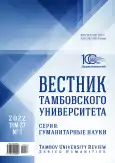Problems of mastering speaking in English in 8th–9th grade students and ways to solve them
- Authors: Kalachnikova R.S.1
-
Affiliations:
- Derzhavin Tambov State University
- Issue: Vol 27, No 1 (2022)
- Pages: 113-126
- Section: ТЕОРИЯ И МЕТОДИКА ОБУЧЕНИЯ ИНОСТРАННОМУ ЯЗЫКУ В СРЕДНЕЙ ШКОЛЕ
- URL: https://bakhtiniada.ru/1810-0201/article/view/298191
- DOI: https://doi.org/10.20310/1810-0201-2022-27-1-113-126
- ID: 298191
Cite item
Full Text
Abstract
An important role in teaching a foreign language is played by taking into account not only objective difficulties, but also subjective reasons caused by the peculiarities of the age, psychology and personal interests of the student. Despite the numerous publications on problems in learning a foreign language in secondary school, there are practically no studies that include an analysis of problems of both an objective and subjective nature in teaching English to speak - it is speaking that is noted by teachers and students in grades 8th–9th as the most difficult section in the study of a foreign language. The purpose of the study is to identify the main difficulties in teaching speaking that teachers and students face, and to find ways to solve the identified problems. The main research methods are observation and questioning of teachers and students. The results of the study are described: overcoming the most pronounced difficulties in teaching speaking (fear (50 %), lack of knowledge (29,7 %), lack of practice (20,3 %)) involves the development of a new format of classes that will allow you to cope with identified barriers. The scope of the results of the work varies from teaching English in the framework of school education to teaching it in higher educational institutions, as well as in advanced training courses. It is proved that speaking is one of the most difficult sections of learning a foreign language, both in the opinion of teachers and in the opinion of students in grades 8th–9th. Based on the survey data, it was suggested that the use of English-language films and tasks developed for them in English lessons, taking into account the recommendations of researchers in the field of adolescent psychology, will improve the quality of mastering the ability to speak English.
About the authors
R. S. Kalachnikova
Derzhavin Tambov State University
Author for correspondence.
Email: roxy0308@mail.ru
ORCID iD: 0000-0002-3978-1129
Post-Graduate Student of 44.06.01 Theory and Methods of Teaching and Education (Foreign Language) Programme
33 Internatsionalnaya St., Tambov 392000, Russian FederationReferences
- Zabusova E.I., Lazareva A.Y., Kolodchenko V.V. Razvitiye rechevoy deyatel’nosti [Development of speech activity]. Simvol nauki: mezhdunarodnyy nauchnyy zhurnal – Symbol of Science: International Scientific Jour-nal, 2018, no. 10, pp. 82-83. (In Russian).
- Zolotareva S.A., Mezhova M.V. Obucheniye govoreniyu kak vidu rechevoy deyatel’nosti v kontekste mezhdu-narodnogo vzaimodeystviya studentov [Teaching speaking as a type of speech activity in the context of international students’ interaction]. Vestnik Kemerovskogo gosudarstvennogo universiteta kul’tury i iskusstv – Bulletin of Kemerovo State University of Culture and Arts, 2019, no. 48, pp. 207-212. (In Russian).
- Chaney A.L., Burk T.L. Teaching Oral Communication in Grades k-8. Boston, Allyn and Bacon Publ., 1998.
- Likhacheva O.N. Priyemy obucheniya ustnoy rechi vo vzaimosvyazi s razvitiyem myshleniya na zanyatiyakh po russkomu yazyku kak inostrannomu na prodvinutom etape obucheniya [Methods of oral speech teaching in conjunction with the development of thinking in lessons of Russian as a foreign language at an advanced stage of learning]. Novyye tekhnologii – New Technologies, 2009, no. 1, pp. 96-98. (In Russian).
- Kainz F. Psychologie der Sprache: in 4 Bd. Stuttgart, 1951. (In German).
- Abushkin B.M., Kontsevenko Y.N., Kozikov D.D. K voprosu o sotsial’nom razvitii sovremennykh shkol’nikov [On the issue of the social development of modern school students]. Sistemnaya psikhologiya i sotsiologiya – Systems Psychology and Sociology, 2020, no. 1 (33), pp. 100-111. https://doi.org/ 10.25688/2223-6872.2020.33.1.08. (In Russian).
- Nikolayeva A.-M.Y. Predstavleniye o kognitivnykh sposobnostyakh detey-bilingvov v nauchnoy literature. Opyt otsenki kognitivnogo potentsiala bilingval’nykh obrazovatel’nykh programm [The concept of the cognitive abilities of bilingual children in the scientific literature. Experience in assessing the cognitive potential of bilingual educational programs]. Nauka i shkola – Science and School, 2016, no. 3, pp. 93-97. (In Russian).
- Nikolayeva A.-M.Y. Vliyaniye obucheniya leksike vtorogo yazyka metodom pogruzheniya v yazykovuyu sredu na kognitivnoye razvitiye rebenka pri osvoyenii bilingval’noy obrazovatel’noy programmy [Influence of teaching second language vocabulary by immersion in the language environment on the cognitive development of a child when mastering a bilingual educational program]. Mezhdunarodnyy nauchno-issledovatel’skiy zhurnal – International Research Journal, 2016, no. 12-4 (54), pp. 67-70. https://doi.org/ 10.18454/IRJ.2016.54.240. (In Russian).
- Shepelenko T.M. Psikhologicheskiye aspekty izucheniya inostrannykh yazykov [Psychological aspects of learn-ing foreign languages]. Vestnik PNIPU. Problemy yazykoznaniya i pedagogiki – PNRPU Linguistics and Peda-gogy Bulletin, 2017, no. 1, pp. 117-125. https://doi.org/10.15593/2224-9389/2017.1.12. (In Russian).
- Kalachnikova R.S. Osobennosti obucheniya govoreniyu na angliyskom yazyke uchenikov 8–9-kh klassov [Special aspects of English speaking teaching in 8 and 9 forms]. Derzhavinskiy forum – Derzhavin Forum, 2020, vol. 4, no. 15, pp. 119-125. (In Russian).
Supplementary files








